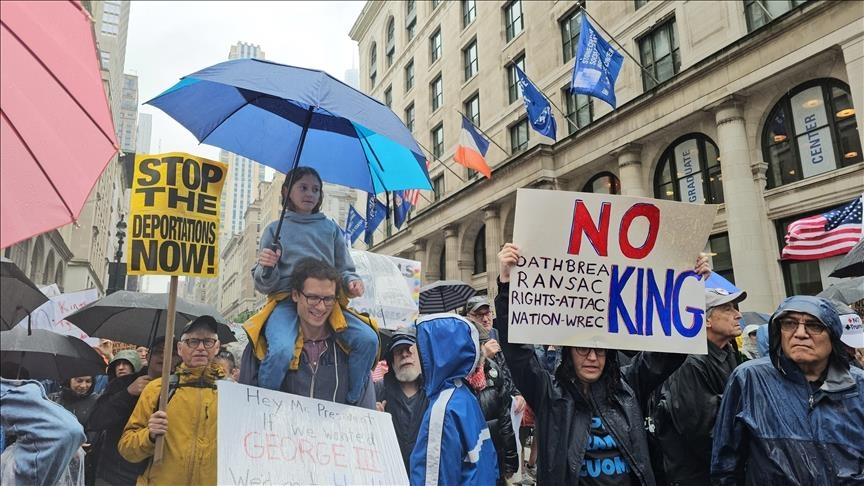Iranian Protests Continue, U.S. Gives Full Backing
He said the students fought back with stones against the police forces who fired tear-gas to disperse them at Shahid Beheshti university, the capital’s second largest.
The protestors shouted such slogans as "Death to dictators!" and "Death to Khamenei!" – which are precarious copies of the "Death to America!" slogan usually chanted at public gatherings.
Supreme Leader Ayatollah Khamenei, head of Iran’s Shiite Muslim establishment, accused Washington of stirring up trouble in the country and warned that the Tehran government would show no mercy with the "hired mercenaries of the enemy."
The Iranian capital saw similar protests Wednesday and Thursday, June 11, 12, that had drawn thousands of students slamming the clerics’ control of the country’s political establishment.
‘Savak-Style’ Freedom
Former president Akbar Hashemi Rafsanjani, speaking at the weekly Friday prayers at Tehran university, charged the United States was orchestrating the troubles in Iran.
"The freedom being offered by the Americans to the Iranian people is that of the sons of members of the Savak (the former shah’s dreaded secret police) … and of counter-revolutionaries," he said.
U.S. Secretary of State spokesman Richard Boucher said that "the United States fully supports Iranians’ aspirations to live in freedom.”
"It’s our hope that the voice of the Iranian people and their call for the rule of law and democracy will be heard and transform Iran into a force for stability in the region," Boucher told reporters in Washington.
But Rafsanjani, who remains an influential figure in the Iranian establishment, said the initial protests on Tuesday night were hijacked.
"Well-intentioned young students gathered because of concern over a (universities) privatization plan, something which was denied by the higher education ministry," he said.
"But counter-revolutionaries came and started shouting slogans" to divert the protests, said Rafsanjani.
Khamenei said Washington had realized it could not overthrow the Islamic republic militarily and "wanted to create trouble in Iran… divide the people and create a chasm between the regime and the populace".
In a speech in the southern city of Varamin broadcast on state television, he said that if the United States "sees that disgruntled people and adventurers want to cause trouble, and if it can turn them into mercenaries, it will not hesitate to do so in giving them its support."
U.S. Backing
Meanwhile, the United States gave its full backing to the anti-government protestors in Iran but the State Department refused to address Khamenei’s accusations.
"We applaud the Iranian people for calling attention to the destructive policies of the Iranian government that do such a disservice to its population," he said.
"Iran’s support for terrorism, pursuit of weapons of mass destruction and denial of human rights deter the kind of foreign investment that could help create jobs for numerous unemployed and underemployed Iranians," Boucher said.
Secretary of State Colin Powell this week said Washington hoped Iranians would instigate change from within to make Iran a "less troublesome member of the world community."
Iran is a part of U.S. President George W. Bush’s "axis of evil" and is accused of seeking to develop nuclear weapons and supporting organizations Washington deems to be terrorist. Iran denied all of the charges.
U.S. National Security Advisor Condoleezza Rice took tough aim at Iran, warning it not to meddle in the formation of new power structures in Iraq and to halt any illicit weapons programs, the same charges intensively leveled against neighboring Iraq before the U.S.-British invasion.
Rice said Saturday, May 31, that Washington would like to see a regime change in Iran, amid reports that the Pentagon is pressing on with plans to push for a public uprising to topple the current Tehran government.
"We must, as an international community, be resolved to say to the Iranians that the pursuit of weapons of mass destruction, particularly nuclear weapons, is not acceptable."
Two months since rolling into, the U.S. forces have not found any of Iraq’s alleged weapons of mass destruction, the main justification for the invasion, leading to speculations that it was launched on false pretexts.
Britain’s Prime Minister Tony Blair shares the U.S.’s belief that Iran harbors ambitions to become a nuclear power and is determined to address what he sees as a "huge concern," a senior British government aide was quoted as saying in Friday’s edition of The Times.
The broadsheet said it had learned that Britain’s two-year-old policy of "engagement" with Iran will be reviewed unless the Islamic state curbs such ambitions.
"There is no plan of action, but he (the prime minister) is determined that it must be addressed," the aide added.
The U.N.’s nuclear watchdog agency is to meet in Vienna Monday to hear a report that says Iran has failed to honor its nuclear safeguards agreement and which has the United States calling for a strong resolution of concern, diplomats said.
The regular meeting of the 35-nation board of governors of the International Atomic Energy Agency "could go the whole week," IAEA spokeswoman Melissa Fleming said.
The report on Iran comes after some five months of IAEA inspections in Iran, following a visit there by IAEA director general Mohamed ElBaradei in February.
Western diplomats close to the IAEA said this will most likely not lead to the IAEA passing on the issue of Iraqi nuclear violations to the U.N. Security Council, a last-ditch measure that could lead to international sanctions.



